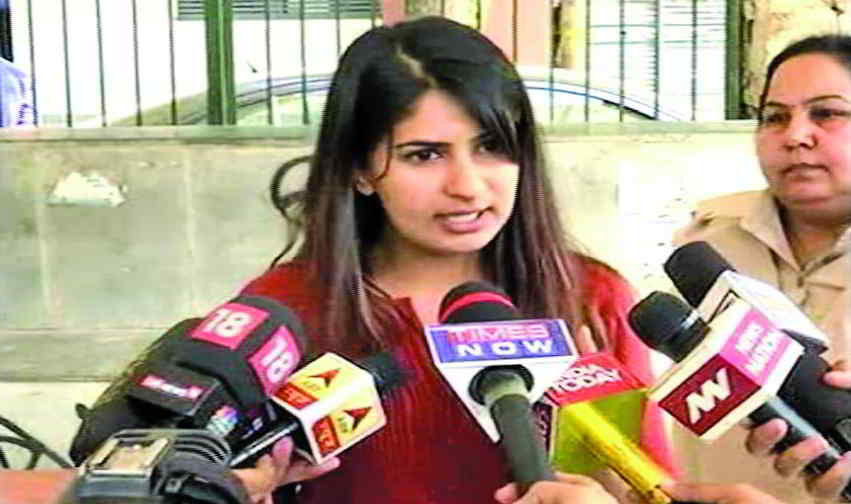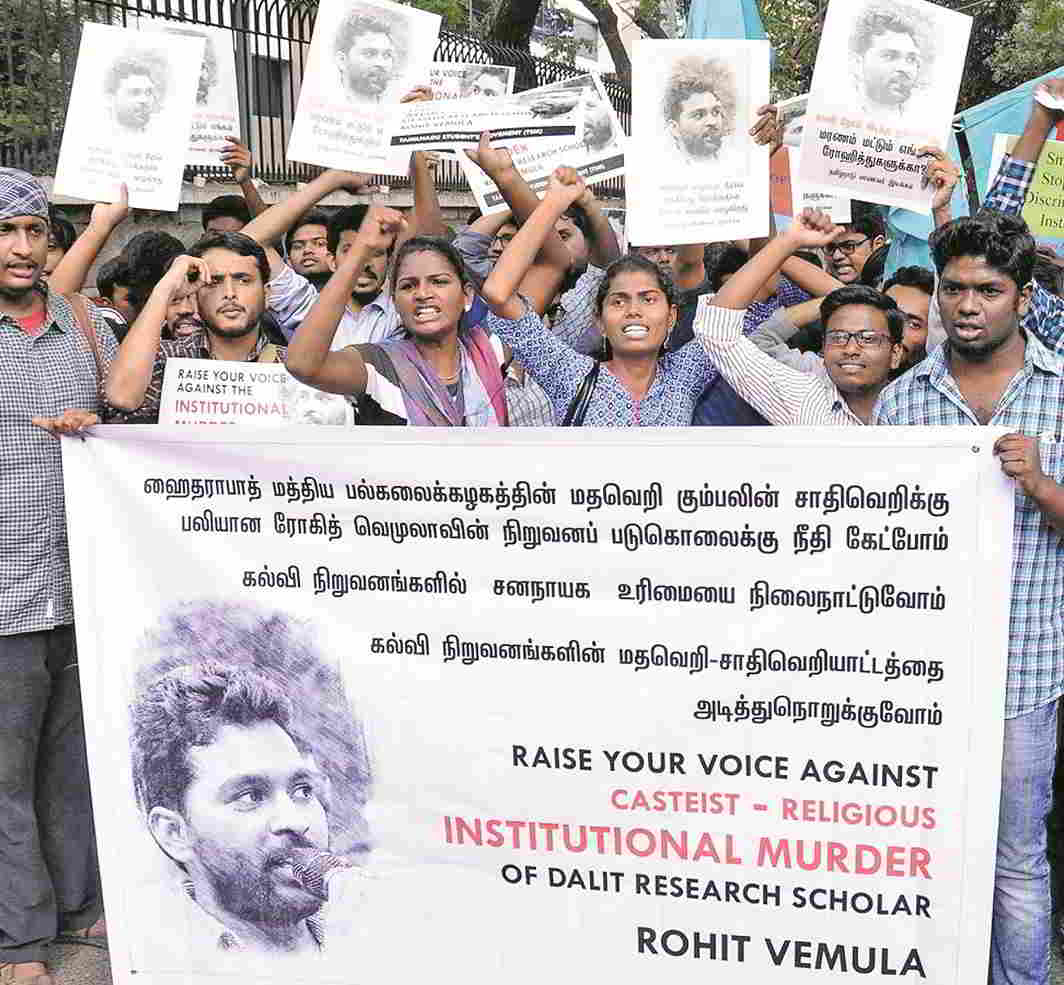
With the BJP’s massive victory in the 2014 general elections, right-wing forces have emerged stronger than ever before and are pushing contrarian views
~By Seema Guha
Attacks on freedom of speech and ultra-nationalism go hand-in-hand. Whether it was Hitler’s Germany in the 1940s where any criticism of the leader was seen as an affront to German nationhood or Narendra Modi’s India of 2017, criticism is deemed anti-national. Everyone who does not share the Hindutva ideology is dubbed anti-national, pro-Pakistani or a third columnist working for destabilising India.
The constitution guarantees freedom of speech, but this is under constant attack now by those who believe it is time to assert their definition of nationalism to the exclusion of others. This is where the problem lies. Commenting on the fracas at Ramjas College, sociologist Ashish Nandy said during a television talk show: “It is an assault on the constitution. This will not stop. Be prepared for worse.” Yes, this will be a long and painful struggle.
At the heart of the present unseemly confrontation in Indian campuses is the Hindutva brigade’s efforts to regain lost ground. With Prime Minister Narendra Modi at the helm of affairs, the BJP’s student wing is feeling empowered and the larger Hindutva family believes it has the perfect opportunity to assert its views.
RISE OF THE ABVP
It is a fact that since Independence, the dominant influence in educational institutions in India has been that of the Left or Left of centre. The right-wing ABVP had been active but did not have much impact. When the NDA was in government with Atal Bihari Vajpayee as prime minister, the effort to break the Left bastions was not so apparent. This could possibly be because Vajpayee did not enjoy the kind of support that Modi has. Or maybe simply because he did not encourage it. But with a strong leader like Modi with a massive majority in the Lok Sabha, Hindutva cadres are all enthused and the battle is on with the blessings of senior ministers of the government.
When finance minister Arun Jaitley, one of the Modi’s well-respected cabinet colleagues, dubs the campus protests as “an alliance of subversion’’ at the Lon-don School of Economics, it is apparent that the government is fully backing the ABVP. Jaitley said that the idea of free speech cannot extend to assaulting the country’s sovereignty.
Who are these subversive elements, the enemy of the people? None other than young Indians with a different point of view. It is amazing that senior ministers make startling accusations against the dissenters. And this is playing out not just in Ramjas College but across campuses in India. The enemies are Hyderabad Central University’s Dalit researcher Rohith Vemula (who was driven to suicide by the machinations of the ABVP together with the University authorities), Kanhaiya Kumar and Umar Khalid of JNU and now, Gurmehar Kaur of Lady Shri Ram College, a premier women’s college in Delhi.
GURMEHAR ATTACKED
Kaur has been threatened and trolled for speaking out against war. As a woman, she has been subjected to the worst kind of chauvinist comments, including from Minister of State for Home Kiren Rijiju. He had the gumption to say in a typical patriarchal style: “Who is polluting her mind.’’ Meaning of course, that the Leftists are doing so. “Gurmehar Kaur is being used as a pawn,” Rijiju said later.
Kaur shot back that she was 20 years old and had a mind of her own. Do men think that an educated woman of 20 cannot see what is happening all around? Kaur is neither a supporter of Left parties, nor aligned to any other political outfit. She is just an average intelligent young woman who does not like what she sees. The ABVP is outraged because she has impeccable credentials.
She is the daughter of an army officer who was killed during insurgency. As the daughter of a “patriot”, she would have been a great symbol for the ABVP. What has enraged many in the right-wing is the video she posted on Facebook where she said: “Pakistan did not kill my father, war did.’’
This is the typical response of a peacenik who understands the horror of war. The Hindutva brigade must be happy that Kaur has now stepped down as the poster girl of the campaign. Abused and even compared to Dawood Ibrahim, she must be traumatised.

PREDICTABLE RESPONSES
The space for differing views is shrinking every day. The violence in Ramjas was over Umar Khalid presenting a paper at a seminar. Could the ABVP activists not have refuted his argument, word-for-word at the seminar? Do ABVP members not have the intellectual capacity to take on Khalid? Campuses are places for free-flowing thoughts, not vandalism. The ABVP seems to have more brawn than brain. Why else should they attack teachers and students and throw stones at the room where the seminar was to take place?
And our police force, used as they are to following the diktats of the government in power, behaved true to form. They twiddled their thumbs and looked on, refusing to act. The partisan behaviour of the police is too well-known to comment here. Remember when JNU scholar Kanhaiya Kumar was attacked in court? The police, instead of helping him, was out in strength protecting the goons posing as lawyers, who were running riot and attacking reporters gathered in the court grounds. No one from the government questioned the police, though all spoke out against violence.
Another campus is now in the limelight for all the wrong reasons. This is Ashoka University, a world-class liberal arts institution in Sonepat, where one would expect free-flowing exchange of ideas. Three of its faculty members—Rajendra Narayanan from the Mathematics department, Saurav Goswami, deputy manager, Academic Affairs, and Adil Mustaq Shah, programme manager, Academic Affairs—left the University last year. They were in trouble for signing a petition against the killing of Hizbul militant Burhan Wani along with 85 students. Ashoka University insisted that they left of their own accord. But it now seems that Narayanan was asked to leave.
There are allegations that the authorities came under pressure to sack him from “outside’’ forces. If this can happen in a high-profile institution which does not depend on the government for funds, one can understand the pressure vice-chancellors in other institutions are up against? But the issue is, why give in when the Mathematics professor had the backing of the entire Faculty Council?

BEING EXTRA-CAUTIOUS
After the Emergency when Prime Minister Indira Gandhi suspended the fundamental rights of citizens, veteran Socialist leader George Fernandes is alleged to have said that when journalists are asked to bend, they crawl. That, on first glance, seems to be the case with Ashoka University. A cautious administration wanting to be on the right side of the powers-that-be forced Narayanan to quit.
India should learn from America. President Donald Trump may keep talking about “fake news”. The White House may try to keep The New York Times, CNN, news website Politico and a few other sites from attending a background briefing, but the journalists are united and continue to take on the Trump administration. Whether it is on conflict of interest or banning of nationals from several Muslim countries, the press and the judiciary are together to uphold the First Amendment. It is time for India to fight back to preserve the fundamental rights guaranteed by the constitution.
Every BJP spokesperson on television these days says that a strong government cannot allow this kind of subversion. Does a strong India mean an India where no one questions the ultra-nationalism that is being preached by the ideologues? Can a country of 1.25 billion—speaking in diverse languages, practising different faiths, having different food habits and cultures—be expected to uniformly echo the sentiments of the RSS view of India? India’s genius lies in its diversity. The sooner the Hindutva brigade realises this, the better it will be for the country.

